Planning a Move?
Let's Stay in Touch. Sign up for Touchdown Highlights
About
Services
Consultations
NEW! ☀️ Knowledge Hub
Contact
Knowledge Hub
How to retire in Portugal
Published
October 3
2025
Visas & Residency
Reviewed by Experts

Published
October 3
2025
If you’ve ever imagined spending your retirement years surrounded by sunshine, good food, and a slower pace of life, Portugal might already be on your radar. Retiring in Portugal has become increasingly popular with Americans and other expats who are drawn to the country’s safe communities, welcoming culture, and affordable lifestyle.
Knowing how to retire in Portugal involves more than simply choosing a place you’d love to live. Successful retirement abroad requires an understanding of visa options, healthcare access, taxes, and the practical steps needed to make the move.
This article will walk you through each stage of the retirement process while highlighting the benefits, challenges, and choices that come with making Portugal your new home.
In 2026, the Global Citizen Solutions Intelligence Unit ranked Portugal as the world’s best country to retire, awarding it an overall score of 92.61 for combining lifestyle benefits with practical advantages that make settling abroad easier.
Here are the main reasons why Portugal is such a strong choice for retirees:
Together, these factors explain why Portugal continues to lead global retirement rankings and remains a highly attractive option for those planning their next chapter abroad.
Portugal is open to both EU and non-EU citizens who want to make the country their retirement home. Citizens of the EU, EEA, and Switzerland enjoy freedom of movement, meaning they can relocate without needing a visa and simply register their residency once they arrive. This makes access to healthcare, housing, and other services straightforward.
Non-EU citizens can also retire in Portugal but will need to apply for a visa before relocating. While the process involves more paperwork, Portugal has a clear residency framework that allows retirees from outside Europe to settle legally and enjoy the same benefits once approved.
Retiring in Portugal is possible for both EU and non-EU citizens, but the process looks slightly different. EU, EEA, and Swiss nationals can relocate freely and register their residency after arrival. Non-EU citizens, including Americans and Britons, must apply for a residence visa before moving.
In both cases, retirees need to show documentation that demonstrates their ability to live independently in Portugal. This includes:
Once these requirements are met and residency is secured, retirees gain access to local services, healthcare, and the right to live in Portugal long-term.
For non-EU citizens, the two most common routes to residency are the D7 visa and the Golden visa.
The D7 visa is designed for retirees and financially independent individuals who earn passive income from pensions, rentals, dividends, or similar sources. Applicants must prove at least €870 per month (≈€10,440 per year in 2026), plus additional amounts for spouses (50%) and children (30%).
With this visa, you can live in Portugal full-time, access public healthcare, travel freely in the Schengen area, and after five years, apply for permanent residency or citizenship. Family members such as spouses, children, and dependent parents can also be included.
The Golden visa offers residency through qualifying investments in Portugal. Options include investing at least €500,000 in regulated funds, €500,000 in scientific research, €250,000 in cultural heritage, or €500,000 in Portuguese companies with job creation.
Holders need only spend 7 days in Portugal in the first year and 14 days in each following two-year period, making it one of the most flexible residency programs in Europe. Family members can also be included, and after five years, holders may apply for permanent residency or citizenship.
One of the major benefits of retiring in Portugal is the opportunity to secure long-term stability through citizenship. After five years of legal residency, retirees can apply for Portuguese citizenship or permanent residency.
To qualify, you’ll need to:
Citizenship brings additional benefits, including the right to vote in Portugal, hold a Portuguese passport, and enjoy full EU citizenship rights such as free movement, healthcare, and education access across the bloc.
For many retirees, this makes Portugal not only a welcoming place to settle but also a gateway to a secure future within the European Union.
You must apply for a long-term residence visa for retiring in Portugal as an American, most commonly through the D7 Visa for passive income earners or the Golden Visa for investors. Once approved, they gain access to healthcare, public services, and residency rights. After five years, Americans can apply for Portuguese citizenship, and since dual citizenship is allowed, they can keep their U.S. passport while gaining the benefits of EU citizenship.
Post-Brexit, UK nationals follow the same process as other non-EU citizens and need a long-term residence visa such as the D7 or Golden Visa. With residency, they enjoy the same rights as other retirees, including healthcare access, Schengen travel, and legal protections. After five years, they can seek Portuguese citizenship, holding it alongside their British passport thanks to Portugal’s dual citizenship policy.
For retirees, Portugal strikes a good balance between quality of life and affordability.
The biggest factor is housing. Buying property averages about €2,622 per square meter across the country, though Lisbon (€3,644) and the Algarve (€3,334) are at the higher end. Regions such as Alentejo (€1,507) and Central Portugal (€1,448) are far more budget-friendly.
Renting follows a similar pattern: a one-bedroom in central Lisbon usually ranges from €1,200–€1,500 per month, while in Porto or Faro the same apartment is closer to €800–€1,000.
Everyday costs also remain manageable. A month’s groceries for one person usually adds up to €200–€300, and it’s common to enjoy fresh produce, seafood, and local wines at prices much lower than in the U.S. Dining out doesn’t need to be a luxury either; beer often costs around €1, and quality Portuguese wine is affordable enough to be part of daily life.
Getting around is inexpensive too. A monthly public transport pass typically costs €40–€50, and many retirees don’t feel the need to own a car thanks to efficient buses, trams, and metro systems.
Healthcare is another area where Portugal stands out: public services require only small co-pays, while private health insurance generally falls between €50 and €100 a month. Utilities like electricity, water, and heating average €100–€130 per month, high-speed internet runs €30–€40, and even Uber rides are inexpensive. Even leisure is easy on the budget, with a cinema ticket under €10 and gym memberships around €35–€40.
Altogether, pensions and retirement savings stretch further because the cost of living in Portugal compared to USA is significantly lower, allowing retirees to enjoy a comfortable lifestyle without overspending.
One of the reasons Portugal continues to attract retirees is its variety of lifestyle options. Whether you prefer golden beaches, vibrant cities, or quiet countryside, the country offers something for every taste and budget. Here are some of the most popular destinations to consider:
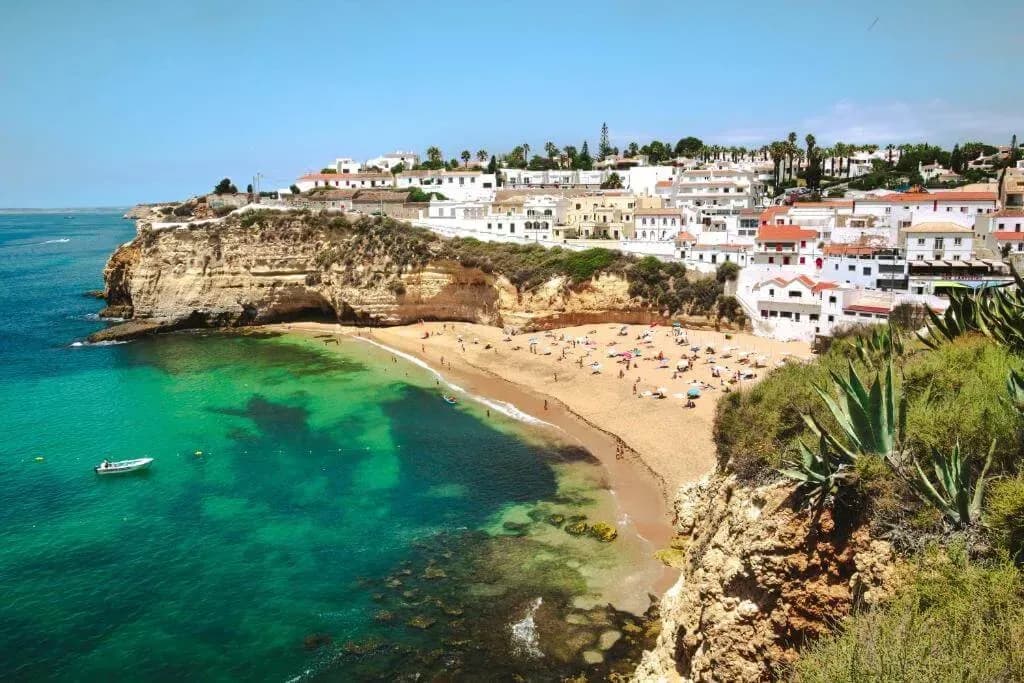
Source: TourHero
The Algarve is the classic choice for retirees, thanks to its warm climate, dramatic coastline, and relaxed pace of life. It’s particularly popular with English-speaking expats, many of whom settle in retirement communities dotted across the region’s 16 municipalities. Property prices vary depending on proximity to the coast, and the cost of living is manageable. The Algarve is also famous for its golf courses, making it a haven for active retirees who want sunshine and recreation year-round.

Source: Amanda Wanders
Situated in the Atlantic, Madeira offers a mild climate and lush scenery, perfect for retirees who prefer an island lifestyle. It has fewer tourists than the Algarve but a steadily growing expat community. While living costs can be slightly higher than on the mainland, housing options are still diverse and affordable compared to much of Western Europe. Madeira is ideal for those who value nature, tranquility, and a slower pace of life.
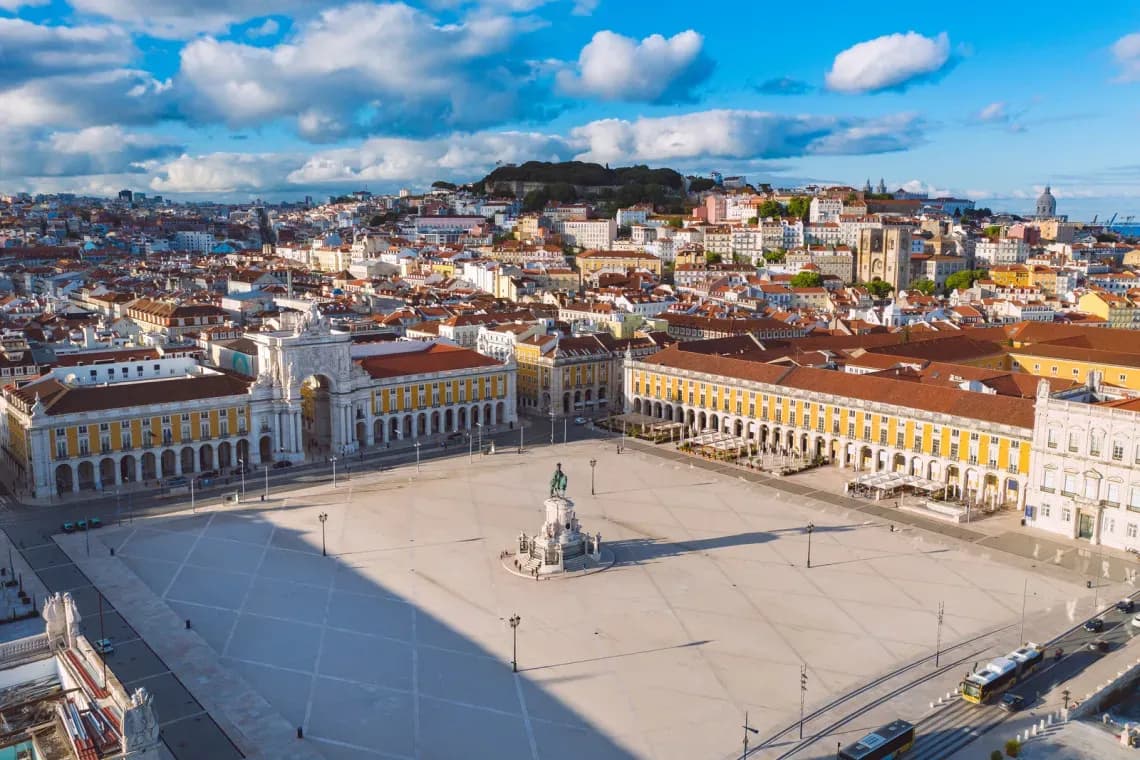
Source: Portugal Getways
Lisbon, the capital, blends historic charm with modern conveniences and a thriving expat community. It offers retirees a lively cultural calendar, international dining, and excellent healthcare access.
Real estate in central Lisbon is among the most expensive in the country, but nearby areas such as Setúbal provide quieter living while keeping the capital’s amenities close by. For those who want city living without losing access to nature, Lisbon and its surrounding areas are an excellent choice.
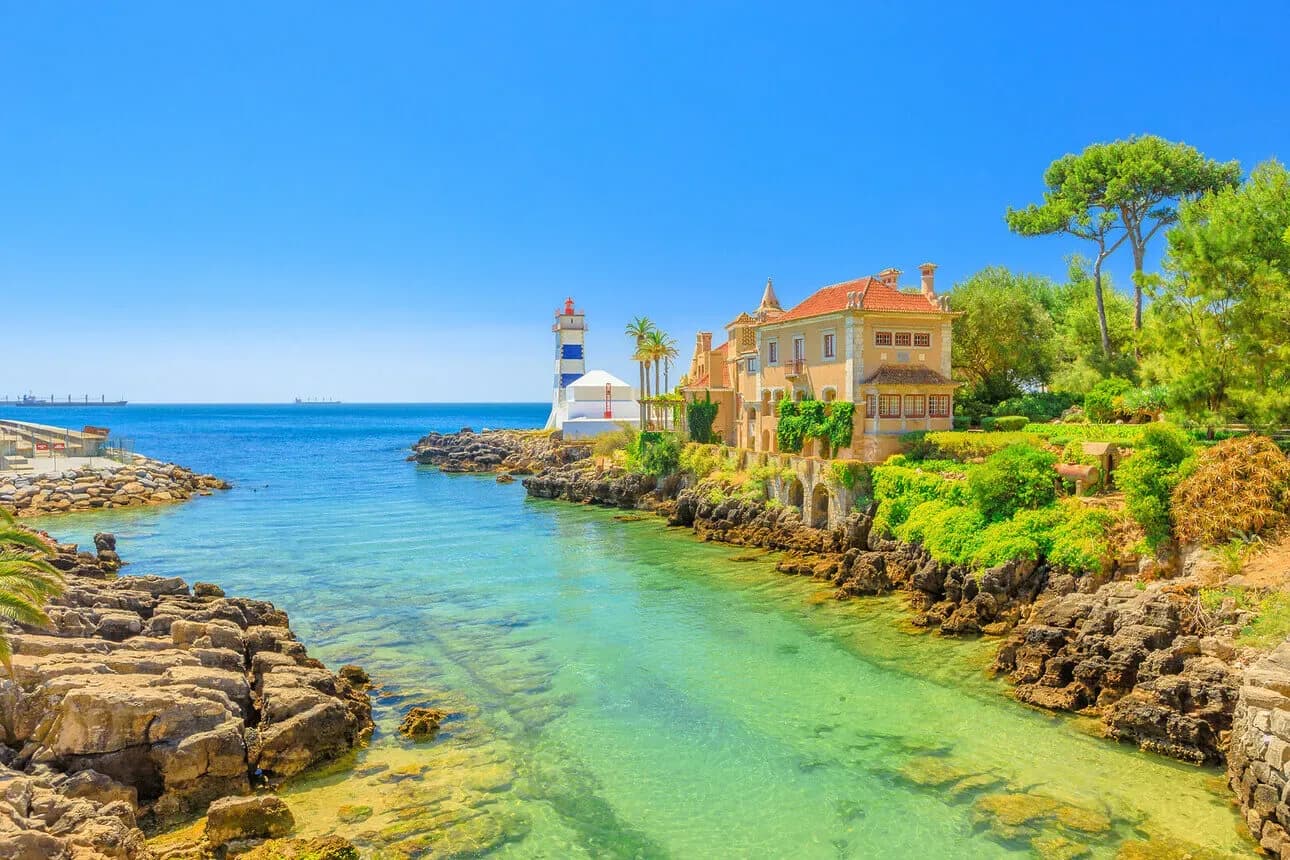
Source: EnVoIs
Just 30 minutes from Lisbon, Cascais offers coastal beauty with cosmopolitan flair. Known for its beaches, historic streets, and cultural attractions, it attracts retirees looking for a relaxed yet upscale environment.
Cascais is also a hub for outdoor activities, with hiking trails, cycling routes, and golf courses nearby. Its combination of seaside charm and easy access to Lisbon makes it one of Portugal’s most desirable retirement spots.
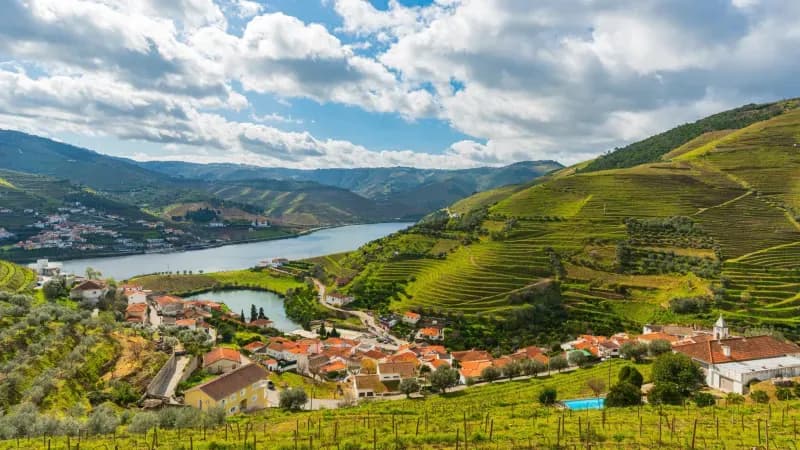
Source: The National Adventure
Northern Portugal is often overlooked but has much to offer. Porto, the region’s capital, boasts a UNESCO-listed old town, riverside charm, and a growing expat population. Beyond Porto, the Douro Valley offers peaceful countryside living surrounded by vineyards, while smaller towns in the north combine affordability with authenticity. Property prices here are among the lowest in the country, and the region also enjoys access to rugged coastlines and quieter beaches.
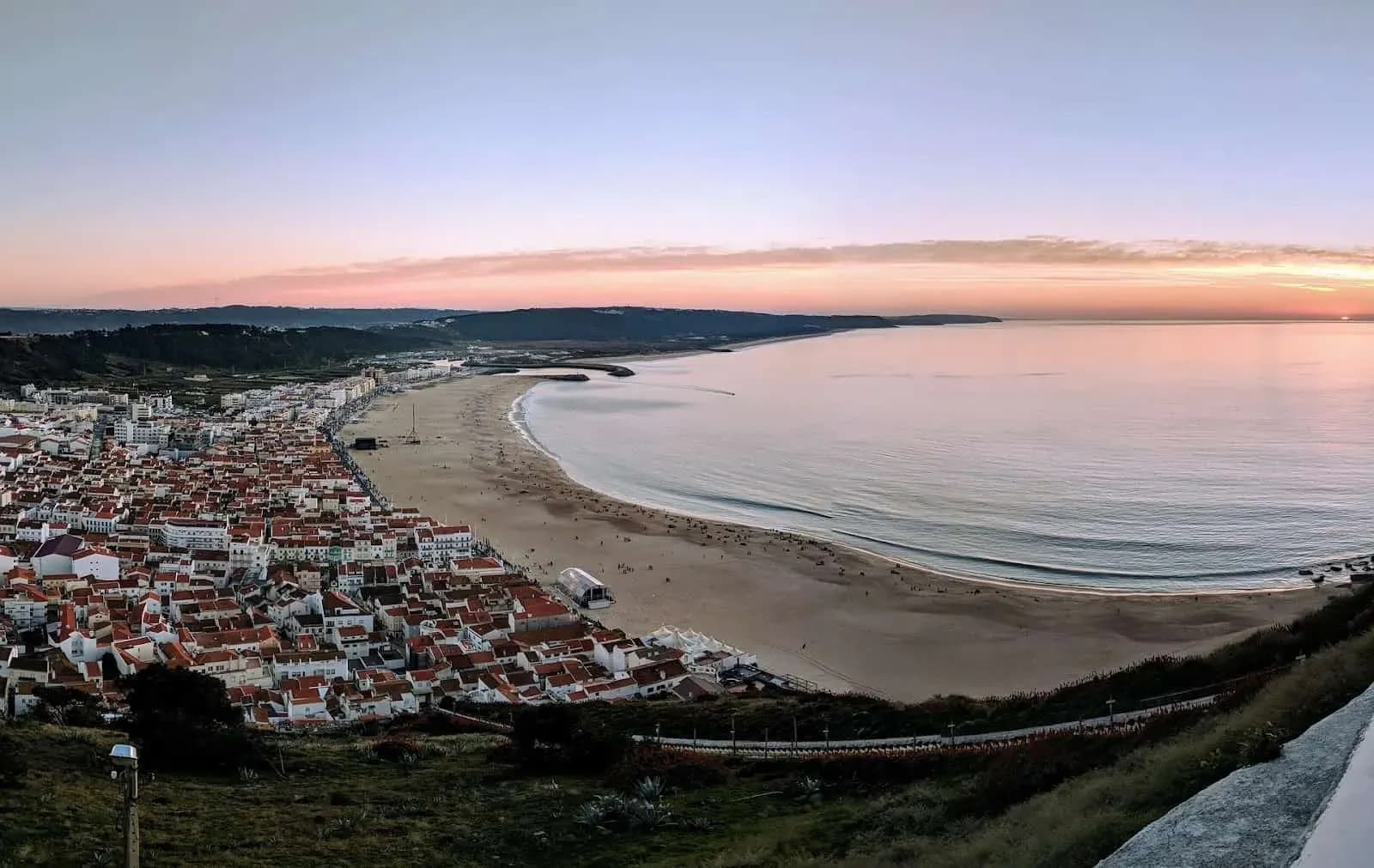
Source: Global Residence Index
Stretching between Lisbon and Porto, the Silver Coast offers retirees an affordable alternative to the Algarve. Towns such as Nazaré, Peniche, and Caldas da Rainha combine coastal living with traditional Portuguese charm. The region is less crowded with tourists, property prices are more accessible, and it has a growing expat community. For those seeking seaside life at a slower pace and lower cost, the Silver Coast is an excellent option.
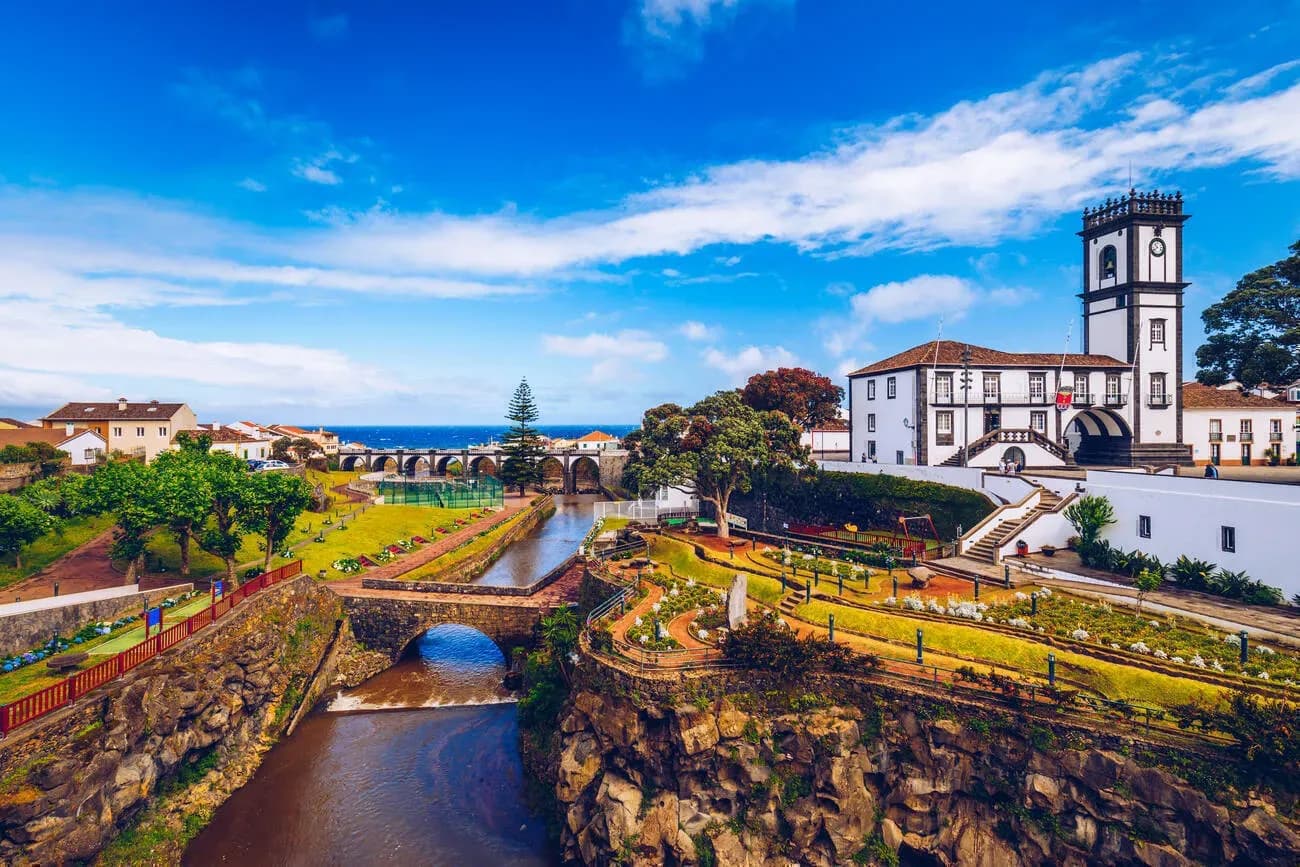
Source: TravelBogue
For retirees who want a truly unique lifestyle, the Azores archipelago offers lush green islands, volcanic landscapes, and a close-knit community atmosphere. The cost of living is modest, housing options range from traditional cottages to modern apartments, and the pace of life is laid-back. While more remote than mainland Portugal, the Azores attract those seeking natural beauty and a peaceful retreat.
Looking for other options? Discover more in our article: The best places to live in Portugal.
Portugal taxes residents on worldwide income, with progressive rates that can reach high brackets, so a little planning goes a long way.
The headline change is NHR 2.0 (IFICI), a 10-year incentive aimed at highly skilled professionals in approved sectors. Most retirees won’t qualify for IFICI, which means foreign pensions are generally taxed at normal progressive rates.
If you do qualify for IFICI (e.g., you take an eligible role or set up a qualifying Portuguese business), eligible Portuguese employment income is taxed at 20% for up to 10 years, and many types of foreign income (dividends, interest, rental, capital gains) can be exempt, except income from blacklisted jurisdictions, which is taxed at 35%.
Keep these essentials in mind:
If you’re unsure whether IFICI fits your situation, or you just want a pension-focused plan, book a short consultation and we’ll map your visa, tax, and post-arrival setup in one go, so your retirement budget stays predictable.
Healthcare is one of Portugal’s strongest advantages for retirees. The country runs a public system (SNS) that provides affordable access to doctors, hospitals, and prescriptions. Residents usually pay only small co-pays, while care for seniors and children is often free. Once you hold legal residency, you can register with the SNS and access these benefits.
Many retirees also choose to take out private health insurance for shorter wait times, wider choice of doctors, and coverage for services not included in the public system, such as dental care. Private insurance is affordable by international standards, averaging €50–€100 per month, with basic plans even lower.
Together, the mix of public and private options gives retirees flexibility and peace of mind. Whether you rely on the SNS, add a private policy, or combine both, healthcare costs in Portugal remain far below those in the United States, making it easier to stay healthy without straining your retirement budget.
Retirees moving to Portugal should be aware that the country follows forced heirship rules. This means a fixed portion of your estate, often two-thirds, must go to “legitimate heirs,” which include your spouse, children, or parents. Only the remaining share can be freely distributed according to your wishes. For many expats, this system may not match the inheritance plans they had in their home country.
To avoid conflicts, it’s essential to draft a Portuguese will or update your existing one to clarify how your assets should be handled. EU Regulation 650/2012 gives foreign residents in Portugal the right to choose the law of their nationality to govern their estate.
In practice, this means you can elect for your home country’s inheritance laws to apply instead of Portuguese rules. Making this choice explicit in your will ensures your estate is managed the way you intend.
Professional advice is highly recommended, especially if you own property or have heirs in more than one country. With the right planning, retirees can make sure their wishes are respected and their families are spared unnecessary complications.
For many retirees in Portugal, the biggest adjustment is the language. English is widely spoken in larger cities and tourist areas, but learning Portuguese makes daily life much smoother and helps build stronger connections with locals. Taking language classes before and after your move, using apps, or reading about Portuguese history and culture are all practical ways to prepare.
Social connections also play a big role in feeling at home. Active expat and retiree networks make integration easier, with groups like Retire in Portugal on Facebook and the Over 50 (Avocado) Social Group on Meetup in Lisbon offering plenty of opportunities to meet others. Many towns host regular expat meetups, and it’s common to find hiking groups, volunteer projects, or hobby clubs where newcomers can quickly make friends.
Adapting to Portugal’s slower pace of life is another part of the transition. Bureaucratic processes can take time, but patience and persistence usually pay off. Locals are welcoming, and small daily interactions, such as chatting with neighbors over coffee, help build a sense of belonging.
Another option for retirees is joining retirement communities, which exist across the country in coastal, rural, and urban settings. These communities often provide healthcare facilities, social events, and services tailored to older residents. Some are designed with international retirees in mind, offering multilingual support and amenities that make settling in easier.
Touchdown is Portugal’s most trusted relocation platform. Backed by an experienced team of Portuguese lawyers, we take the stress out of moving abroad by bringing everything you need to relocate and thrive into one integrated, easy-to-use platform.
Every relocation story is unique. Whether you’re moving alone or with your family, Touchdown builds a tailored plan around your goals and circumstances.
From preparing your visa application to setting up your NIF and bank account, structuring your taxes, and supporting you after you arrive, Touchdown turns what can be a complex process into a straightforward and stress-free experience.
Here’s how Touchdown supports your retirement visa process:
Start with our free Eligibility Checker to see whether the D7 Passive Income Visa or the Golden Visa best suits your retirement plans. Within minutes, you’ll have clarity on your options. From there, we arrange a 1:1 session to map out your timeline and create a personalized relocation plan.
Our licensed Portuguese lawyers review all your paperwork, whether it’s pension statements, rental agreements, investment documents, or insurance policies. Every detail is checked to make sure your application meets consulate requirements and is ready to submit without delays.
We set up your Portuguese bank account and NIF remotely with trusted financial institutions. You’ll receive the required documentation for your visa submission, with clear step-by-step guidance.
We handle booking your visa appointment at the appropriate consulate, guide you through the interview process, and prepare you with everything needed to present your case confidently. If requirements or schedules change, we help you adjust quickly.
Our support continues after visa approval. Once in Portugal, we assist with registering your address, attending your AIMA appointment, updating your NIF, and setting up tax residency, ensuring you’re fully settled and ready to enjoy retirement.
Moving abroad comes with challenges, but you don’t have to face them alone. Whether you’re preparing for retirement, relocating with family, or starting a new chapter in Portugal, Touchdown combines expert legal support, local knowledge, and a step-by-step residency plan so you can make the move with confidence.
Use our free Eligibility Checker to find out which visa is right for you in just minutes.
Or, if you’d like tailored guidance, book a 1:1 consultation with our team and get clear answers for your situation.
Portugal offers retirees a high quality of life, affordable healthcare, relatively low living costs, and a safe, welcoming environment. The mild climate, rich culture, and established expat communities also make it easier to settle in and enjoy day-to-day life.
Yes. Retiring in Portugal from USA is possible through a residence visa such as the D7 Passive Income Visa or the Golden Visa. Once approved, U.S. citizens gain access to healthcare, public services, and after five years of residence, the option to apply for Portuguese citizenship.
On average, a single retiree can live comfortably on €1,300–€1,700 per month, while couples often budget €2,000–€2,500 depending on location and lifestyle. Costs are higher in Lisbon and the Algarve, and lower in regions like Alentejo or Central Portugal.
Pros include a pleasant climate, affordable healthcare, safety, and a slower, relaxed pace of life. Retirees also enjoy cultural richness and strong expat networks. Cons may include bureaucratic delays, language barriers outside major cities, and rising housing costs in popular areas.
Yes. Under the U.S.–Portugal tax treaty, Social Security benefits are taxed only in the country of residence. If you are a Portuguese tax resident, your U.S. Social Security is taxed in Portugal at progressive rates. The U.S. does not tax these benefits once you’re a resident in Portugal.

Author Bio
Henrique Moreira de Sousa
Henrique leads Immigration at Touchdown. Henrique is a Portuguese Lawyer and immigration law specialist that has overseen the relocation of hundreds of expats to Portugal.
Related Articles
Related Articles
Let's Stay in Touch. Sign up for Touchdown Highlights
